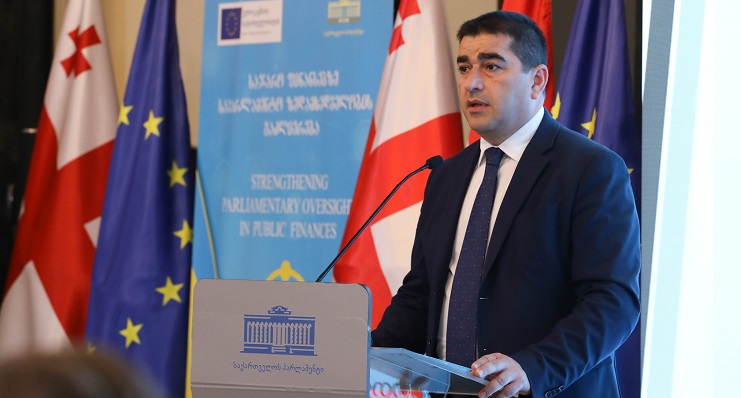Georgia closer to EU than Ukraine, Moldova “on fundamental questions” - Parliament Speaker

Georgian Parliament Speaker Shalva Papuashvili on Friday said the country should have been granted a membership candidate status in June 2022. Photo: .Parliament press office
Georgian Parliament Speaker Shalva Papuashvili on Friday said Georgia was ahead of both Ukraine and Moldova in “fundamental questions” related to their alignment with the European Union, in comments on the European Commission's new report on the three countries aspiring for EU membership.
Papuashvili said Georgia had shown “best results” in three of the six groups of questions in the report, including for matters related to “fundamental areas” evaluating the trio’s alignment of EU laws.
He also claimed the country should have been granted a membership candidate status in June 2022 - as Moldova and Ukraine were - had a “merit-based” decision been made by EU authorities.
Good news from Brussels: based on EC’s report on sectoral part of Georgia’s questionnaire,???????? is a Trio leader in 3 out of 6 clusters: fundamentals, internal market & competitiveness - ????????’s heart & soul. It only proves that ???????? should be a candidate state on the basis of merit. pic.twitter.com/UUqvh8EHog
— Shalva Papuashvili ???????? (@shpapuashvili) February 3, 2023
The report also makes us once again think of the Georgians, who, with the use of all possible measures, have been trying to assure the bloc their country does not deserve the status”, he said in reference to the domestic opposition.
“Along with this report, several international surveys published recently put Georgia ahead of several EU and NATO member states for its efforts in combating corruption and ensuring human freedoms”, Papuashvili added, citing the Corruption Perception Index by Transparency International and the Human Freedom Index by United States-based Cato Institute and Canadian-based Fraser Institute.
The European Commission's 57-page analytical report on Georgia was released on Thursday, focusing on the country’s alignment of EU laws in 33 chapters following the country’s application for membership last year.
It completed the Commission’s opinion on Georgia’s application, assessed the country’s overall capacity to uphold obligations of membership, and offered guidance on the work ahead under the different acquis chapters.
 Tweet
Tweet  Share
Share